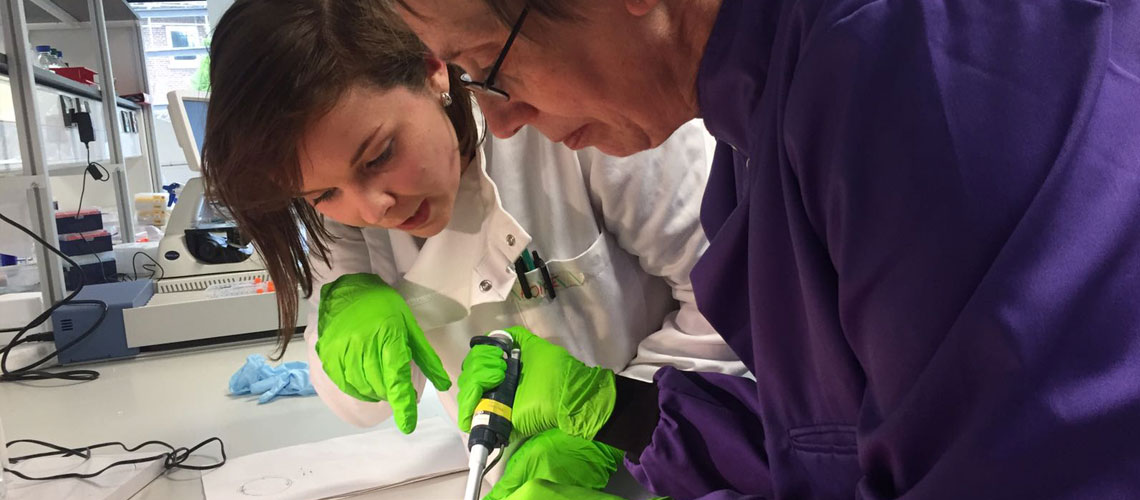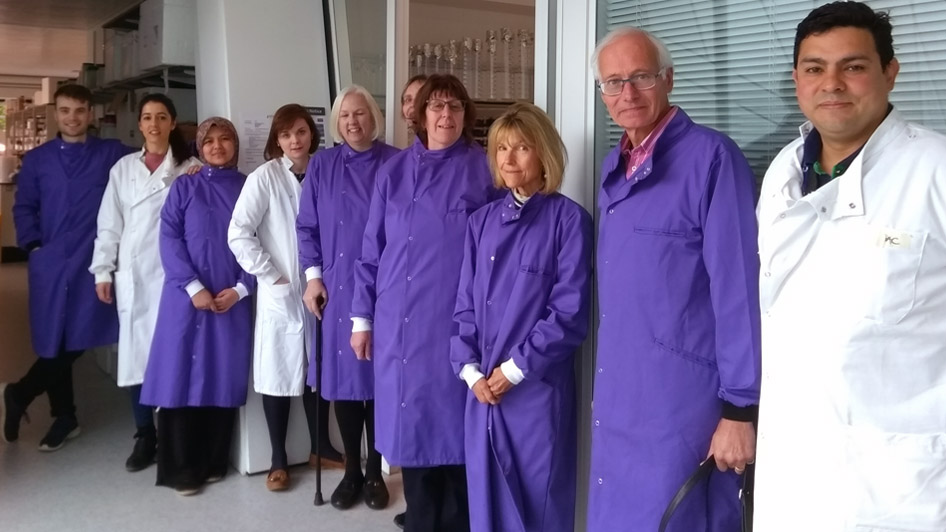Patient power: Involving the public in cancer research
Every two minutes, someone in the UK is diagnosed with cancer. With one in every two people likely to get a cancer diagnosis at some point in our lives, it is a disease that affects us all.

At Manchester, we are working towards a world in which more of us survive cancer. Our research focuses on the prevention and early detection of the disease, as well as pioneering new and experimental treatments.
But we couldn’t do this work without the input of patients and the public, who contribute to our world-leading research in a variety of ways.
Exchanging knowledge
Effective public engagement is a valuable tool for both researchers and the public to learn and to share expertise.
Involving the public in biomedical research brings in knowledge and experience from a wide range of backgrounds. These different perspectives can result in research that is more meaningful to patients and carers, and improves their experiences.
Maggie Wilcox is an advocate for Independent Cancer Patients’ Voice (ICPV) and a breast cancer survivor. In her role with the University’s Manchester Breast Centre she works with PhD students and post-doctoral researchers.
“I love the enthusiasm and keen interest of these early career researchers”, explains Maggie.
“The opportunity to add the patient perspective to their research is welcome. I find their work exciting and their genuine caring is very apparent.”
From her experience in research she has found that there needs to be a mutual respect and willingness to learn from each other, which requires trust and the recognition of different skills.
“Patients were all people before becoming patients and we have a wide range of experience to bring to research.
“But by becoming involved in research, patients also have the responsibility to become informed and acquire basic knowledge of biology, so that they can make a more meaningful contribution”, says Maggie.
The value of gaining patients’ perspectives and building strong working relationships between researchers and public contributors is also evident to researchers themselves.
Dr Cliona Kirwan is an NIHR Clinician Scientist in Surgical Oncology and a Consultant Oncoplastic Breast Surgeon. She runs a research study interviewing patients and the public to find out what they think priorities in breast cancer research should be.
“For my team, the direct interaction with patients and the public through focus groups is really valuable to help shape our research priorities”, says Dr Kirwan.
Dr Suzanne Johnson, Lead for Social Responsibility for the Division of Cancer Sciences, describes the relationships built up between researchers and patients through public involvement as “mutually insightful, beneficial and informative bringing reciprocal understanding and a valuable exchange of knowledge”.
“Patient involvement and engagement allows the public to see the human side of research and allow the researchers to see the real-life impacts of their work. ”
Humanising research
Working in a laboratory away from the direct care of patients, biomedical researchers don’t often get to meet with the people whose lives are impacted by their research.
Patient involvement and engagement in research can provide a means to bridge the gap between researchers and patients. It can allow the public to see the human side of research and allow the researchers to see the real-life impacts of their work.
Dr Denis Alferez is a post-doctoral research associate at Manchester Breast Centre and has been involved in a number of lab open days, which allow the public to experience a lab environment and interact with researchers.
“It gives me and other researchers further encouragement as to why we have dedicated ourselves to such a vocation as science”, says Dr Alferez.
“It reinforces our passion when we speak to patients who underwent or are experiencing cancer treatments. It simply broadens the mind, as to how important our work can be despite the timelines.”
In her work as a post-doctoral research associate with the Children’s Cancer Group, Dr Johnson has also experience these benefits. She was able to offer a former lymphoblastic leukaemia patient work experience in her lab.
“It was such a positive experience and very humbling to be spending time with someone who had received treatment which we were exploring in our lab at the time. It gives a unique and personal perspective to the research we are involved in on a daily basis and that is hugely motivating”, says Dr Johnson.

Showcasing research
All biomedical research is done in order to improve public health and care, however the public are mostly unaware of how research is done or what research is currently underway.
Engagement and involvement provides a way for the public to learn about research and for researchers to showcase their work to new audiences.
Holding a research open day is a great way to engage patients with research. It allows them to see where research is taking place and to ask researchers questions about their work.
Recently the Manchester Breast Centre held an interactive open day for advocates from ICPV.
Dr Rob Clarke, Reader in Breast Biology and Director of Manchester Breast Centre, was involved in organising the day.
“Since we are largely funded by charity and tax payers’ money, it is important to show patients and the public how our research can have an impact, to answer their questions and to invite their comments and suggestions”, said Dr Clarke.
For Dr Alferez, public engagement provides a platform to inspire as well as to engage.
“It is a lovely feeling when you connect with kids that maybe one day may choose to do science at a higher level.
“Public engagement prompts us scientists to convey our scientific theories in a more clear and simple manner. Talking to kids is the best the way their young minds tackle the topics we often explain. I would very much encourage any scientist at any level, to engage in public facing activities.”
Find out more about cancer research at Manchester. If you are inspired to become a public contributor, discover how you can get involved in our research.
